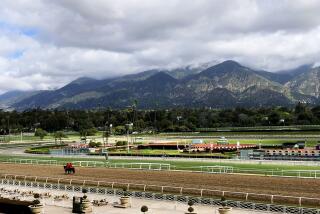Bill to Boost Arabian Racehorses Draws Fire
SACRAMENTO â A bill to encourage Arabian horse racing in California was criticized Tuesday by breeders of other racehorses, who contended that it could hamper their efforts to gain a larger share of the stateâs lucrative race market.
The bill by Assemblyman Tom McClintock (R-Thousand Oaks) would require state racing officials to set race dates for Arabian horses at the State Fair and Exposition in Sacramento and county fairs âso far as it is practical.â Arabian horses, many of which are bred in Ventura County, now are allowed to race at tracks with pari-mutuel betting.
McClintock said his aim is to provide equal opportunity for Arabian horses to race on the fair circuit with thoroughbreds, quarter horses and appaloosas. He also said the bill would âprovide fairness and equity for the treatment of Arabian horses.â The horses were originally bred by Bedouin tribesman for desert battles.
McClintockâs measure was approved by the Assembly 72 to 1 in June and sent to the Senate, where the Governmental Organization Committee on Tuesday conducted a hearing. He hopes to have the committee take action on the measure in January.
Stimulate Racing, Breeding
His bill is one of three designed to stimulate the breeding and racing of Arabian horses in California. In September, Gov. George Deukmejian signed into law another McClintock bill that authorized the state Horse Racing Board to allow up to 20 weeks a year of Arabian-horse racing. A third measure by Assemblyman Frank Hill (R-Whittier), which is now before the Senate Appropriations Committee, has stirred the most controversy because it could lower the tax rate for Arabian horses. McClintock is a co-author of the bill.
The focus of Tuesdayâs hearing was on McClintockâs proposal for Arabian race dates.
Supporters of the bill said there are so few race dates in California that Arabian owners are forced to ship their horses to the East, where racing of Arabian horses is growing in popularity.
T. Randolph Catanese, a Thousand Oaks lawyer representing the Arabian Racing Assn. of California, told the committee: âThis industry is really an industry ready to explodeâ in popularity.
Criticsâ Argument
But critics contend that if the bill becomes law, it could result in fewer race dates for other breeds of racehorses.
Ancil Hoffman, lobbyist for Cal-Western Appaloosa Racing, which has pushed for appaloosa racing in the state, testified that McClintockâs bill would ultimately limit the number of appaloosa races, which âwould be the end of our breed,â he said. Over the last 20 years, appaloosa races have gradually gained a foothold at tracks in the state.
In an interview, Jack H. Clifford, lobbyist for the Pacific Coast Horse Racing Assn., which represents quarter-horse owners and breeders, said if the bill becomes law, âsomebodyâs going to give upâ race dates.
During the hearing, there also was a brief discussion of Hillâs bill, which would change the way taxes are levied on Arabian horses. Now, the overwhelming majority of the stateâs 56,000 Arabian horses--most of which are show horses--are taxed as personal property at slightly more than 1% of their assessed value.
For example, the tax on a horse worth $1 million is about $11,000, according to the state Board of Equalization. However, there is a cap on the tax for racehorses ranging from $12 to $1,000, depending on the age of the horse. According to an analysis by the Senate Committee on Revenue and Taxation, Hillâs bill seeks to expand the definition of racehorses, making certain breeds less than 3 years old--and all Arabians less than 4 years old--eligible for the lower tax rate.
The Assembly in May approved the measure 61 to 5 and sent it to the Senate, where in August it stalled in the Appropriations Committee and was put over for consideration until next year.
Bill âObjectionableâ
Among the opponents are Ventura County and the state Board of Equalization. In an Aug. 28 letter to Sen. Robert Presley (D-Riverside), Douglas Bell, executive secretary of the Board of Equalization, said: âThe primary thrust of this bill appears to be to provide preferential tax treatment for Arabian horses, which, unlike thoroughbreds or harness horses, are usually bred for show rather than racing.â
According to Bell, the bill is âparticularly objectionableâ because only 68 of the 56,000 registered Arabian horses in the state raced in California last year.
In an interview on Tuesday, Ventura County Assessor Jerry Sanford said he has surveyed other assessors and found that at least 17 counties treat Arabian horses as personal property.
He said there are now about 3,000 Arabian horses quartered in the county, including between 200 and 300 at Ventura Farms, a major breeder. If Hillâs bill becomes law, the county estimates that it would lose about $375,000 in tax revenues in the first year.
McClintock minimized the objections to the bill, asserting that it merely clarifies existing statutes, âso itâs not a new tax break being put into the code.â
More to Read
Sign up for Essential California
The most important California stories and recommendations in your inbox every morning.
You may occasionally receive promotional content from the Los Angeles Times.





![[20060326 (LA/A20) -- STATING THE CASE: Marchers organized by unions, religious organizations and immigrants rights groups carry signs and chant in downtown L.A. "People are really upset that all the work they do, everything that they give to this nation, is ignored," said Angelica Salas of the Coalition of Humane Immigrant Rights. -- PHOTOGRAPHER: Photographs by Gina Ferazzi The Los Angeles Times] *** [Ferazzi, Gina -- - 109170.ME.0325.rights.12.GMF- Gina Ferazzi/Los Angeles Times - Thousands of protesters march to city hall in downtown Los Angeles Saturday, March 25, 2006. They are protesting against House-passed HR 4437, an anti-immigration bill that opponents say will criminalize millions of immigrant families and anyone who comes into contact with them.]](https://ca-times.brightspotcdn.com/dims4/default/34f403d/2147483647/strip/true/crop/1983x1322+109+0/resize/840x560!/quality/75/?url=https%3A%2F%2Fcalifornia-times-brightspot.s3.amazonaws.com%2Fzbk%2Fdamlat_images%2FLA%2FLA_PHOTO_ARCHIVE%2FSDOCS%2854%29%2Fkx3lslnc.JPG)




